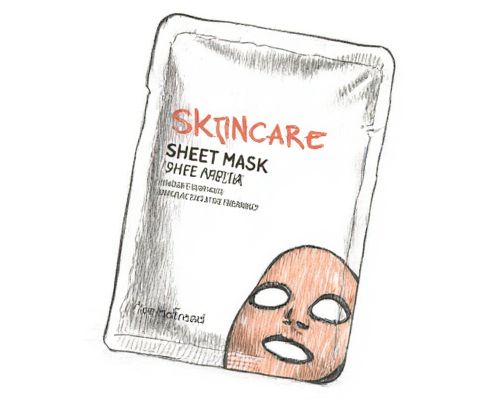
Sheet mask Illustration
Sheet masks deliver concentrated nutrients directly to the skin, enhancing hydration and promoting a radiant complexion. Infused with ingredients like hyaluronic acid and antioxidants, they help soothe irritation and improve skin elasticity. Regular use supports a refreshed and glowing appearance by locking in moisture and boosting skin vitality.
Introduction to Sheet Masks in Skincare
Sheet masks are pre-cut fabric sheets soaked in concentrated serums designed to deliver potent active ingredients directly to the skin. These masks provide intense hydration, brighten complexion, and address specific concerns such as anti-aging, acne, or dullness. With their convenience and effectiveness, sheet masks have become a staple in modern skincare routines for enhancing skin health and radiance.
Key Benefits of Using Sheet Masks
Sheet masks deliver intense hydration and nourishment by infusing your skin with concentrated serums enriched with vitamins, antioxidants, and minerals. They help brighten your complexion, reduce fine lines, and improve skin elasticity by promoting collagen production. Using a sheet mask regularly enhances moisture retention, soothing irritation and leaving your skin smooth, plump, and radiant.
Popular Ingredients Found in Sheet Masks
Sheet masks often feature hyaluronic acid to deeply hydrate and plump the skin, vitamin C for brightening and antioxidant protection, and niacinamide to improve skin texture and tone. Aloe vera and green tea extracts provide soothing and anti-inflammatory benefits, ideal for sensitive or irritated skin. Collagen-infused masks support skin elasticity and firmness, making them popular choices for anti-aging skincare routines.
How to Choose the Right Sheet Mask for Your Skin Type
Selecting the right sheet mask depends on your skin type and specific concerns; for oily skin, opt for masks with ingredients like tea tree or charcoal to control excess sebum, while dry skin benefits from hydrating elements such as hyaluronic acid and aloe vera. Sensitive skin requires calming formulas with ingredients like chamomile or centella asiatica to reduce irritation and redness. Always check for hypoallergenic labels and avoid masks with alcohol or fragrances if your skin is prone to sensitivity or allergies.
Step-by-Step Guide to Applying Sheet Masks
Start by thoroughly cleansing your face to remove dirt and impurities, ensuring optimal absorption of the sheet mask's nutrients. Gently unfold the sheet mask and align it with your facial contours, avoiding air bubbles for even coverage. Leave the mask on for 15-20 minutes, then remove and pat the remaining essence into your skin to maximize hydration and nourishment.
Common Mistakes to Avoid with Sheet Masks
Applying a sheet mask on unclean skin reduces its effectiveness by trapping dirt and bacteria, leading to breakouts. Leaving the mask on for longer than the recommended 15-20 minutes can cause the sheet to dry out and pull moisture back from the skin. Using sheet masks too frequently may disrupt the skin's natural barrier, resulting in irritation and sensitivity.
Incorporating Sheet Masks into Your Skincare Routine
Incorporating sheet masks into your skincare routine enhances hydration and delivers concentrated active ingredients efficiently to the skin. Choose sheet masks formulated with key ingredients like hyaluronic acid, vitamin C, or peptides to target specific concerns such as dryness, dullness, or aging. Use a sheet mask 2-3 times weekly after cleansing and toning to maximize absorption and boost overall skin radiance.
Sheet Masks for Specific Skin Concerns
Sheet masks formulated with ingredients like hyaluronic acid target hydration for dry skin, while those infused with salicylic acid help reduce acne and unclog pores. Masks containing niacinamide or centella asiatica are effective for calming redness and soothing sensitive skin. Selecting sheet masks based on active components ensures tailored skincare solutions for issues such as dullness, pigmentation, and aging.
DIY Sheet Masks vs. Store-Bought Options
DIY sheet masks offer customizable ingredients like honey, aloe vera, and green tea, allowing targeted treatment for specific skin concerns such as hydration, anti-aging, and soothing irritation. Store-bought options often contain advanced formulations with peptides, hyaluronic acid, and antioxidants, providing consistent results and convenient application. Choosing between DIY and commercial sheet masks depends on preferences for natural ingredients and customization versus time-saving, clinically tested efficacy.
Frequently Asked Questions About Sheet Masks
Sheet masks are designed to deliver concentrated ingredients such as hyaluronic acid and vitamin C directly to your skin for intense hydration and brightening effects. Common questions include how often you should use them, with dermatologists recommending 1-3 times per week depending on your skin type and concerns. To maximize benefits, ensure your face is cleansed before application and avoid leaving the mask on for more than 20 minutes to prevent moisture loss.
 womendy.com
womendy.com